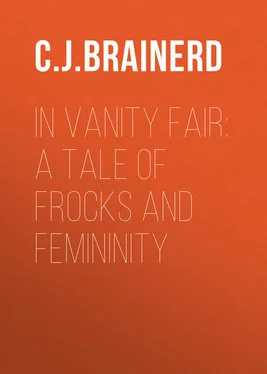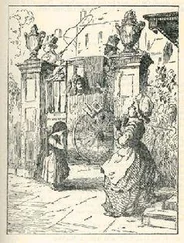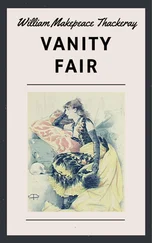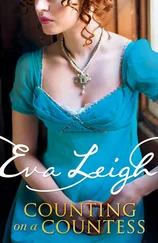Eleanor Brainerd - In Vanity Fair - A Tale of Frocks and Femininity
Здесь есть возможность читать онлайн «Eleanor Brainerd - In Vanity Fair - A Tale of Frocks and Femininity» — ознакомительный отрывок электронной книги совершенно бесплатно, а после прочтения отрывка купить полную версию. В некоторых случаях можно слушать аудио, скачать через торрент в формате fb2 и присутствует краткое содержание. Жанр: foreign_antique, foreign_prose, на английском языке. Описание произведения, (предисловие) а так же отзывы посетителей доступны на портале библиотеки ЛибКат.
- Название:In Vanity Fair: A Tale of Frocks and Femininity
- Автор:
- Жанр:
- Год:неизвестен
- ISBN:нет данных
- Рейтинг книги:5 / 5. Голосов: 1
-
Избранное:Добавить в избранное
- Отзывы:
-
Ваша оценка:
- 100
- 1
- 2
- 3
- 4
- 5
In Vanity Fair: A Tale of Frocks and Femininity: краткое содержание, описание и аннотация
Предлагаем к чтению аннотацию, описание, краткое содержание или предисловие (зависит от того, что написал сам автор книги «In Vanity Fair: A Tale of Frocks and Femininity»). Если вы не нашли необходимую информацию о книге — напишите в комментариях, мы постараемся отыскать её.
In Vanity Fair: A Tale of Frocks and Femininity — читать онлайн ознакомительный отрывок
Ниже представлен текст книги, разбитый по страницам. Система сохранения места последней прочитанной страницы, позволяет с удобством читать онлайн бесплатно книгу «In Vanity Fair: A Tale of Frocks and Femininity», без необходимости каждый раз заново искать на чём Вы остановились. Поставьте закладку, и сможете в любой момент перейти на страницу, на которой закончили чтение.
Интервал:
Закладка:
Eleanor Hoyt Brainerd
In Vanity Fair: A Tale of Frocks and Femininity
PREFACE
The Parisienne, in her subtler phases, is a theme for a feminist of genius; and this little book does not venture upon the psychological deep seas.
Grave issues are tangled in the game of fashion-making; but the world through which My Lady of the Chiffons dances lightly to gay music reeks of frivolity, and the story of the fashionable Parisienne and of the haunts in which she obtains and displays her incomparable frocks must needs be a story of folly and extravagance, best told, perhaps, by snap-shots of the inner courts of Vanity Fair.
The Author.CHAPTER I
FROCKS AND FEMININITY
Clothes and the woman we sing! Given the themes, Paris is obviously the only appropriate setting. Nowhere else do the kindred cults of frocks and femininity kindle such ardent devotion. Nowhere else are women so enthusiastically decorative. There are women more beautiful than the Parisiennes, there are women who spend as much money upon their clothes. Pouf! What is beauty unadorned? What is beauty adorned – provided it is not chic.
That crisp little monosyllable is sadly abused by our Anglo-Saxon saleswomen, but it is a master word for all that, a great word holding in solution the quintessence of things Parisian. It means a subtle something before which mere beauty is humble, and mere luxury is banal. It means coquetry, audacity, charm. It means a thing evanescent, impalpable, unmistakable, absurd, adorable, a thing deliciously feminine, a thing essentially of the world worldly.
That the word should be a French word with no exact equivalent in another tongue is as it should be. The Parisienne is the true "femme chic." She has the secret and she realizes its value, makes a fetich of it, devotes herself to it with a zeal that could flourish nowhere outside of Paris. There are charming women all over the world, but nowhere is femininity so conscientiously occupied in being charming as it is in Paris.
Your true Parisienne begins her creed with, "I believe in coquetry"; and by coquetry she means not merely embryonic flirtation, but all that goes to make sophisticated charm. She is coquette from her cradle to her grave, from her first communion frock to her last cap and shawl. She does not depend upon her natural advantages, she is not unconscious, not simple. She is deliberately, insistently charming, and to gain that end she shows the infinite capacity for taking trouble which amounts to genius. The ill-natured call the result artificiality, and they are right; but the fine art of the artificiality is a thing to conjure with, and through its aid the Frenchwoman retains her charm long after youth and its bloom are fled. Wit wears better than complexion, and tact outlasts figure. Incidentally, much may be done to patch up complexion and figure if wit and tact are on hand to carry off the counterfeit.
To be sure there is something a trifle depressing about the faded ghosts of Parisian youth, the old ladies of Paris who refuse to admit defeat, and, painted, bejewelled, vivacious, defy the years.
Yes, there's a sadness in the struggle, a gentle melancholy such as serves poets for rondels and villanelles, but they are not sad, themselves, those old ladies of Paris. Bless your heart, no! They are gay, excessively gay. They flutter their fans and toss their curled heads and scatter wrinkled smiles and unwrinkled bon mots, and succeed, after a fashion, in their aim; for they are delightful, these faded, worldly belles. They keep their youthful hearts, their keen wits, their absorbing interest in men and things. They have not forgotten how to be amusing; and, under their cleverly applied rouge and powder and false hair and general artificiality, they are still sympathetic, still witty, still wise. Not one's ideal of placid old age, not, perhaps, the grandmothers one would choose for the family tree, but delightful companions still; coquettes who have outlived their youth but not their finesse.
Perhaps the cult of coquetry which is the pervasive spirit of French society would be impossible outside the atmosphere in which it flourishes. It is a part of Parisian tradition, it colours Parisian values, determines Parisian standards. Insensibly the woman who lives in Paris surrenders to this spirit though she may have come of Puritan stock or of Roundhead ancestry. It is in the air of Paris. If one cannot breathe the air and assimilate the germs, one departs. That is all. One returns to Boston or Kansas City or Glasgow or Tewkesbury. Doubtless those women who flee from the insidious assault lead lives more estimable than those who succumb, but they do not learn the gentle art of coquetry in its Parisian form. So much the better for the quietude of Boston and Kansas City and Glasgow and Tewkesbury.
It is probable, highly probable, that the foreigner who recklessly remains in Paris and invites the spirit of the place will show her inevitable lapse from Puritanical grace first in her underwear. French lingerie is the sign and symbol of French femininity. It is the refinement of luxury, the quintessence of coquetry.
To wear a fortune in a gown is something, but to wear a fortune in lace and handwork and cobweb linen hidden away under a frock demurely simple is more, and the Parisienne adores "le dessous." Jewels she may lack – though not for want of conscientious effort to obtain them – but dainty petticoats she will have, and, having them, she will wear them, and wearing them, she will show them. Why not contribute to the sum of humanity's simple joys?
An old lady from a little Missouri town strayed from a Cook's party one day, at the entrance to the Louvre; and, some hours later, a young countrywoman of hers found her occupying one of the Champs Elysées chairs and watching with fearful joy the stream of French womanhood picking its way along walks still wet from an all-night rain.
The old lady clutched the arm of her fellow American and turned a puzzled face away from the passing show.
"My dear, just look at those petticoats and stockings!" she gasped. "The creatures haven't any idea of hiding them. I've been watching for two mortal hours and there hasn't been a let-up yet. Some are finer than others, that's all. But they're all showy, and every single woman has her dress tucked up so you can't miss them. When I saw the first ones I thought I'd struck the French women you read about, – the ones who aren't proper, you know, and I was so interested; but then they kept coming so steadily that I got all mixed up. Hundreds have gone by, all holding their skirts like that and every one of them swishing silk or lace ruffles and showing silk stockings, – and it isn't humanly possible, even in Paris, that they're all bad, now is it?"
Bad? Not the least in the world. They were merely French. The petticoat of Pleasantville, Missouri, and the petticoat of Paris are two separate and distinct things, and the old lady had vaguely grasped an important fact not down upon the Cook's party schedule of information. The Parisienne is Paris. Incidentally there are picture galleries and museums.
The amount of money spent on the "dessous" by a Parisian woman of fashion is madly extravagant and entirely characteristic. It is but a detail of that religion of luxury whose high priests centre in the Rue de la Paix. The average Frenchwoman has a thrifty and frugal side, but the extravagant Frenchwoman spends her money with a light-hearted gaiety and a maximum of picturesque effect. The most prodigal patrons of the great dressmakers and jewellers in the Rue de la Paix are Americans, but the most brilliant figures in the fashionable Parisian world are French. The born Parisienne is the supreme coquette. She wears her clothes with an incomparable air. There is a touch of the actress in her, and in the matter of feminine fashion art can give points to nature, so the Frenchwoman wears with artfully artless grace and naturalness creations whose audacity would reduce a woman of any other nationality to an awkward self-consciousness that would ruin the effectiveness of the costume.
Читать дальшеИнтервал:
Закладка:
Похожие книги на «In Vanity Fair: A Tale of Frocks and Femininity»
Представляем Вашему вниманию похожие книги на «In Vanity Fair: A Tale of Frocks and Femininity» списком для выбора. Мы отобрали схожую по названию и смыслу литературу в надежде предоставить читателям больше вариантов отыскать новые, интересные, ещё непрочитанные произведения.
Обсуждение, отзывы о книге «In Vanity Fair: A Tale of Frocks and Femininity» и просто собственные мнения читателей. Оставьте ваши комментарии, напишите, что Вы думаете о произведении, его смысле или главных героях. Укажите что конкретно понравилось, а что нет, и почему Вы так считаете.












